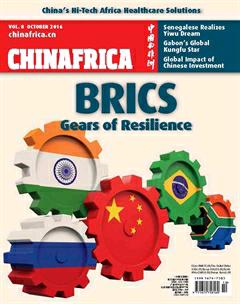Investment Magnet
By+Yu+Nan
Despite the continued slowdown in private sector investment in China during the first half of this year, Wang Jianlin, Founder and Chairman of the Dalian Wanda Group, is brimming with confidence about the Chinese market.
“During the same period, tourism investment, for example, has seen strong growth of 30.5 percent year on year, indicating that industries with development potential are able to attract the eyes of investors,” said Wang, Chinas richest person. He was attending the International Investment Forum 2016, part of the 19th China International Fair for Investment and Trade, held in Xianmen, a coastal city in southeast Chinas Fujian Province, from September 8-11.
Grabbing China opportunity
Harley Seyedin, President of the American Chamber of Commerce in South China (AmCham South China), echoes Wangs sentiments, maintaining a positive outlook on the Chinese economy. This is the 14th year AmCham has taken part in the fair.
“As Chinas economic structure is making faster adjustment, China continues to offer new opportunities to foreign investors and will remain a great destination for the U.S. investors for many years to come,” he said.
A survey of 246 foreign companies conducted by AmCham South China earlier this year showed that 93 percent of all participants are optimistic about their profits growing in China and plan to increase investment in the country.
“Foreign companies cannot do business in China the same as before, because the Chinese market has experienced dramatic changes over the past two decades,” said Seyedin. The Chinese market now welcomes high valueadded products and advanced services, where foreign investors have abundant opportunities to cooperate and develop in many sectors like consumption, health care, e-commerce, and education, he added.
The chambers survey showed that about 75.6 percent of participants report providing goods or services specifically to the Chinese market as their primary business focus rather than exporting goods or services.
Adjusting their China business due to market changes, such as labor costs and return on investment, does not mean China is losing its appeal to these foreign investors, according to Zhan Xiaoning, Director of the Division of Investment and Enterprise of the United Nations Conference on Trade and Development (UNCTAD).
China is still one of the worlds most attractive destinations for investment, according to an annual global investment report by UNCTAD. Foreign direct investment (FDI) into the Chinese mainland rose 6 percent year on year to$136 billion in 2015.
Policy signals
China is determined to become more accessible to global investors by further expanding market access, improving foreign investment policies and protecting the legitimate rights of foreign investors, according to Chinese Vice Premier Wang Yang speaking at the International Investment Forum 2016.
Wang said China has been the top destination for foreign investment among developing countries for 24 consecutive years. More than 850,000 foreign companies have invested in China, with their investment exceeding$1.7 trillion.
In 2015, global FDI flows rose to $1.76 trillion, he said, hitting their highest level since financial crisis in 2008.
However, UNCTAD warned that cross-border investment is expected to contract by 10 to 15 percent this year. Zhan predicted that FDI flows into China will remain at a high level but wont have a drastic increase in 2016.
Despite an industry downturn, Caterpillar sees it as a natural transition and is optimistic about China in a long run, said Chen Qihua, Vice President of Caterpillar Inc., the worlds largest construction and mining equipment maker.
While acknowledging that the business environment in China is becoming more competitive, he stressed the importance of upgrading technology and improving efficiency.
“China is an integral part of Caterpillars long-term global strategy,” said Chen, adding that foreign companies need to make changes to grab new opportunities like the Belt and Road Initiative. China will further open up to the global market by setting up seven new free trade zones, bringing the total to 11.
In September, the Standing Committee of the National Peoples Congress, Chinas top legislature, revised four investment-related laws to ease restriction on overseas investment. These will lay a legal foundation for applying a negative list mechanism to all overseas investment.
Wang vowed that China will build a fairer, more transparent and predictable investment environment for foreign investors, and give equal treatment to domestic and foreign businesses.
Misunderstanding buyouts
China remained the third largest investor in the world, after the United States and Japan, and its outward direct investment rose to $128 billion in 2015, up 4 percent year on year, according to the UNCTADs report.
Zhan said that China plays an exemplary role in supporting Africa through heavy investment and trade promotion. Take Tanzania for example. China is the second largest investor in Tanzania, with more than 500 Chinese businesses in the country. Chinas investment in Tanzania rose to more than $4 billion in 2014.
“With an increasing number of Chinese enterprises investing overseas, China has thus become a major foreign capital source for some developed countries,” said Zhan, adding that as China continues to push forward the Belt and Road Initiative, Chinas direct investment outflows will maintain strong growth momentum.
The acquisition by Chinese companies has been one of the main drivers for Chinas steadily rising outbound direct investment. It has also led to some misunderstanding of Chinas investment and buyout strategy.
Liu Yonghao, Chairman of New Hope Group Co., Chinas largest private agricultural company, does not agree with the perception that China is buying up the world. “Such reports are over-exaggerated,” he said.
Liu believes that it is quite normal for China, as the worlds second largest economy, to participate in global investment. “We have been making great efforts to integrate ourselves into the global economy via cross-border investment and cooperation. In this way, Chinese entrepreneurs will be gradually involved in making international rules,” he said.
Bostjan Skalar, CEO of the World Association of Investment Promotion Agencies, based in Geneva, said cultural differences are everywhere and Chinese companies can deal with issues of cultural differences quite well.
Before entering emerging markets, such as Africa, he suggested Chinese companies better understand local laws and investment policies. Meanwhile, these markets will reap the benefits, when connected to the global value chain.

